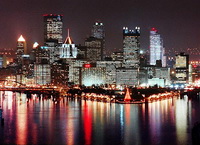Reinvented "Steel City" Chosen for G-20 Summit
In May White House press secretary Robert Gibbs announced that the Obama Administration had chosen to hold the Group of 20 summit in Pittsburgh, Pa., The meeting, which begins Sept. 24 and includes top financial officials from the world's 20 largest economies, carries with it a hefty security burden. In the past, local officials have had to cope with both terrorist threats and violent protests at the site of the summit, and it's the type of logistical nightmare that would seem to demand a venue accustomed to hosting globally important events. So why Pittsburgh?

The pick was left to Obama's discretion after the governors of the G-20 decided the event would be held in the United States. Obama said he chose Pittsburgh to showcase the city's reinvention from an aging industrial town into a tech-heavy, eco-friendly metropolis with a burgeoning alternative-energy sector. The success story isn't all hype — Pittsburgh's unemployment and foreclosure rates are lower than the national average, and the sagging steel industry is no longer the sole engine of the city's economy, TIME reports.
Dubbed the "steel city" for its industrial history, Pittsburgh will live up to its name for a different reason when world leaders meet amid heavy security on Thursday and Friday for the Group of 20 (G20) summit.
Thousands of additional police have been brought in to the western Pennsylvania city and tall steel fencing is being erected along streets around the convention center where 19 leaders of developed and developing countries will meet.
While presidents and prime ministers will be discussing issues such as rebalancing the world economy and tackling climate change, Pittsburgh locals are worried about violent anti-G20 protests and disruption to business and traffic.
"It's a positive thing for Pittsburgh to be shown, but the downtown businesses are afraid. They really don't know what to expect," said Phillip Injeian, 54, a violin maker whose shop near the G20 headquarters is shadowed by a security fence, Reuters reports.
CNN International quoted Dennis Yablonsky, head of the Allegheny Conference on Community Development as saying, "We did not abandon history. We reinvented it. ... We were heavily dependent on one industry. Diversification is the key. You spread the risk across several industries."
Technology, research and health care became larger parts of the economy, as what Yablonsky called an "eds and meds" strategy drew new jobs to the area.
Pittsburgh didn't avoid the recession, he said, but weathered it better than other areas. Local officials are quick to point to a 7.7 percent unemployment rate in August, below the state and national average.
The White House and local officials are trying to contrast the city's rust belt reputation with a new focus on environmentally friendly technology. They note that the David L. Lawrence Convention Center, where the G-20 is being held, is the largest environmentally friendly center in the world.
"We still have steel mills, sure," Yablonsky said, but they're now mixed with high-tech jobs, including green industries.
A sign of this hangs from downtown skyscrapers in the steel city, CNN International reports.
Subscribe to Pravda.Ru Telegram channel, Facebook, RSS!


